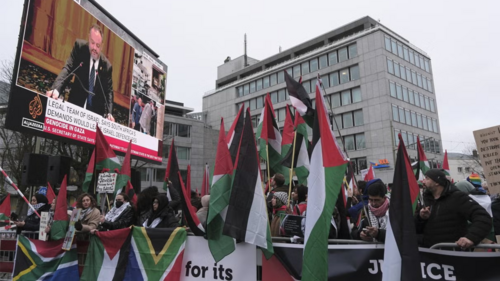South Africa's Case Against Israel is the Fifth Time UN Genocide Law has Been Used this Way

The ICJ is considering whether to approve provisional measures that would immediately order Israel to stop all military operations in the Gaza Strip.
In short: South Africa presented its genocide case against Israel last week at the International Court of Justice, and Israel defended itself against the charges. The ICJ is now considering whether to approve provisional measures that would immediately order Israel to stop all military operations in the Gaza Strip while the broader case is being decided, which could take years. South Africa’s case is only the fifth to use a United Nations genocide law since the law's inception.
What is the UN Genocide Convention?
In 1948, the U.N. General Assembly approved the Convention on the Prevention and Punishment of the Crime of Genocide, which went into effect in 1951.
“The genocide convention was written in 1948, and it basically codified what happened in the Holocaust” as a crime, said Leila Sadat, special adviser on crimes against humanity to the International Criminal Court prosecutor, in a panel discussion at the Chicago Council on Global Affairs.
The law outlined and defined genocide as any of these acts committed “with intent to destroy, in whole or in part, a national, ethnical, racial, or religious group”:
- “killing members of the group”
- “causing serious bodily or mental harm to members of the group”
- “deliberately inflicting on the group conditions of life calculated to bring about its physical destruction in whole or in part”
- “imposing measures intended to prevent births within the group”
- “forcibly transferring children of the group to another group”
The convention also made criminal the conspiracy to commit genocide, incitement to commit genocide, attempted genocide, and complicity in genocide.
“The genocide convention was adopted and had great fanfare, and then sat on the shelf,” said Sadat. “It sat on the shelf for 50 years. In the criminal sense, [it was] never used.”
What Other Countries Have Used the UN Genocide Convention?
Including South Africa’s case against Israel, there have been five cases of a country bringing charges against another using the genocide convention.
The first two uses of the convention were in relation to the violent breakup of Yugoslavia in the 1990s. The first was in 1993, when the Republic of Bosnia and Herzegovina brought a case against the Federal Republic of Yugoslavia, alleging that agents of the Federal Republic (Serbia and Montenegro) were committing genocide against Bosnian Muslims in violation of the convention. The ICJ decided in 2007 that the Republic of Serbia had violated the genocide convention by failing to prevent a 1995 genocide of Bosnian Muslims and that Serbia had also failed to punish the perpetrators of said genocide.
Croatia also brought a genocide charge against the Federal Republic of Yugoslavia in 1999, claiming it was liable for the ethnic cleansing of Croatian citizens. In response, the Republic of Serbia filed a counterclaim accusing Croatia of being responsible for genocide against Serbs who were in Croatia. In 2015, the court decided neither country had committed genocide against the other.
In 2019, Gambia brought a case against Myanmar, alleging that it was committing genocide against the Rohingya, a majority-Muslim ethnic group that lives in Myanmar. This case, which is still making its way through the ICJ, set the precedent that a country not directly involved in or affected by a conflict could still bring a genocide case to the ICJ.
Lastly, in 2022, Ukraine brought a case to the ICJ alleging Russia misused the genocide convention to justify its invasion of Ukraine. Russia said Ukraine was committing acts of genocide in two Ukrainian regions that proclaimed independence from Ukraine, which Russia – but not the broader international community – recognized. Russia refused to appear at the ICJ hearings, and the court approved provisional measures that ordered Russia to stop all military operations in Ukraine.
What is South Africa’s Case Against Israel?
According to South Africa’s application to the ICJ asking it to hear the case, Israel’s actions against Palestinians in the Gaza Strip after Hamas’ Oct. 7 attack are in breach of the 1948 U.N. genocide convention.
The day after South Africa presented its case to the ICJ on Jan. 11, Israel defended itself before the court. Israel largely focused on Oct. 7, when Hamas launched an attack against Israel, killing about 1,200 Israelis, mostly civilians, and taking more than 200 hostages.
In response to the attack, Israel launched a “complete siege” on Gaza that has killed at least 24,000 Palestinians, most of them women and children, waging “the deadliest and most destructive” military campaign in recent history, the Associated Press reported.
Israeli legal adviser Tal Becker told the court that South Africa’s requested provisional measures are an attempt to stop Israel from defending itself against Hamas. South Africa requested provisional measures that include an end to any Israeli military operations in Gaza for the duration of the case.
The Associated Press noted, “Even when acting in self-defense, countries are required by international law to follow the rules of war, and judges must decide if Israel has.”

